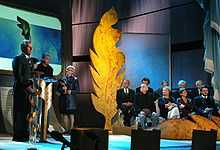Nike Award

The NIKE Literary Award (Nagroda Literacka NIKE) is one of the most prestigious awards for Polish literature. Established in 1997 and funded by Gazeta Wyborcza, Poland's second largest daily paper, and the consulting company NICOM, it is conferred annually in October for the best book of a single living author writing in Polish published the previous year. It is open for nominees from all literary genres, including non-fiction essays and autobiographies. Each year, a nine-member jury selects the laureate in a three-stage process. Twenty official nominees are accepted in May, out of which seven finalists are declared in September. The final decision does not take place until the day of the award ceremony in October. The award consists of a statuette designed by the prominent Polish sculptor Gustaw Zemła and a prize money of currently 100,000 PLN.
In addition to the main jury award, there is an audience award based on the outcome of a vote on the seven official finalists conducted by Gazeta Wyborcza. The verdicts of audience and jury converged only occasionally (2000, 2001 and 2004).
Laureates
Title and details of English translation stated where available.
Jury award
- 2013 - Joanna Bator, Ciemno, prawie noc [1]
- 2012 – Marek Bieńczyk, Książka twarzy
- 2011 – Marian Pilot, Pióropusz
- 2010 – Tadeusz Słobodzianek, Nasza Klasa
- 2009 – Eugeniusz Tkaczyszyn-Dycki, Piosenka o zaleznosciach i uzaleznieniach
- 2008 – Olga Tokarczuk, Bieguni
- 2007 – Wiesław Myśliwski, Traktat o łuskaniu fasoli
- 2006 – Dorota Masłowska, Paw królowej ("The Queen's Peacock")
- 2005 – Andrzej Stasiuk, Jadąc do Babadag ("Travelling to Babadag")
- 2004 – Wojciech Kuczok, Gnój ("Muck")
- 2003 – Jarosław Marek Rymkiewicz, Zachód słonca w Milanówku ("Sunset in Milanówek")
- 2002 – Joanna Olczak-Roniker, W ogrodzie pamięci ("In the garden of memory")
- 2001 – Jerzy Pilch, Pod Mocnym Aniołem ("The Strong Angel Inn")
- 2000 – Tadeusz Różewicz, Matka odchodzi ("Mother is leaving")
- 1999 – Stanisław Barańczak, Chirurgiczna precyzja ("Surgical precision").
- 1998 – Czesław Miłosz, Piesek przydrożny (English edition: Road-side dog, New York: Farrar Straus Giroux, 1998, ISBN 0-374-25129-0)
- 1997 – Wiesław Myśliwski for Widnokrąg ("Horizon")
Audience award
- 2013 - Szczepan Twardoch for Morfina
- 2012 – Andrzej Franaszek for Miłosz : biografia
- 2011 – Sławomir Mrożek for Dziennik 1962–1969
- 2010 – Magdalena Grochowska for Jerzy Giedroyc. Do Polski ze snu
- 2009 – Krzysztof Varga for Gulasz z turula
- 2008 – Olga Tokarczuk for "Bieguni"
- 2007 – Mariusz Szczygieł for Gottland
- 2006 – Wisława Szymborska for Dwukropek ("Colon")
- 2005 – Ryszard Kapuściński for Podróże z Herodotem ("Journeys with Herodot")
- 2004 – Wojciech Kuczok for Gnój ("Muck")
- 2003 – Dorota Masłowska for Wojna polsko-ruska pod flagą biało-czerwoną (English edition: Snow White and Russian Red, New York: Grove Press/Black Cat, 2005, ISBN 0-8021-7001-3)
- 2002 – Olga Tokarczuk for Gra na wielu bębenkach ("Playing on many drums")
- 2001 – awarded jointly to Jerzy Pilch for Pod Mocnym Aniołem ("The Strong Angel Inn"), and Jan T. Gross for Sąsiedzi (English edition: Neighbors: The Destruction of the Jewish Community in Jedwabne, Princeton, NJ: Princeton University Press, 2001, ISBN 0-14-200240-2)
- 2000 – Tadeusz Różewicz for Matka odchodzi ("Mother is leaving")
- 1999 – Olga Tokarczuk for Dom dzienny, dom nocny (English edition: House of Day, House of Night. Writings from an unbound Europe, Evanston, IL: Northwestern University Press, 2003, ISBN 0-8101-1892-0)
- 1998 – Zygmunt Kubiak for Mitologia Greków i Rzymian" ("The Mythology of the Greeks and Romans")
- 1997 – Olga Tokarczuk for Prawiek i inne czasy ("Primeval and other times")
References
- ↑ Tadeusz Sobolewski, Michał Wybieralski (6 October 2013). "Nike 2013 dla Joanny Bator za książkę "Ciemno, prawie noc"". Gazeta Wyborcza (in Polish). Retrieved October 17, 2013.
External links
- Some information in English
- Official site (Polish)